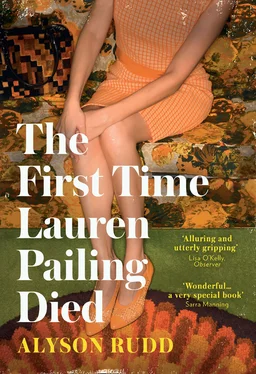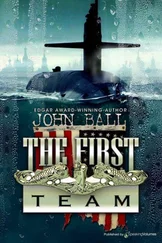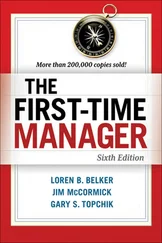Debbie’s family had rented a huge house not far from St Ives. They were joined by Karen’s sister and Karen’s sister’s best friend and her son Brian, who was a gangly twelve-year-old who stuck tightly to Simon as if girls carried infectious diseases. Slowly, they all relaxed and Lauren marvelled at the noise and laughter and the cheating at cards and the arguments over draughts. Other families popped by. Karen’s sister even went on a date. It was all silly and riotous enough for it not to matter when it rained. The adults wandered around in a perpetual state of tipsiness, clutching glasses of wine or beer as Phil Collins played on a perpetual loop in the background. It was hypnotically loud and busy. They all ate when they felt like it and the nightly barbecue lasted for three hours, so that Lauren regularly lost count of how many sausages she had eaten.
On the second evening, Simon was placed in charge of flaming some fatty steaks. As Lauren settled into a canvas chair with a plastic glass of lemonade a thin glistening steel rod appeared in front of her nose. She sharply pulled back her head, fearful of touching it, of the holiday being cut short by the nasty headache such a collision would provoke, and then gingerly leaned forward to spy upon another world. She expected to see simply more sausages and perhaps a new face or two, so unremarkable had been most of her recent peeks through the glass. Instead she saw Simon, wearing a faded red T-shirt that suited him better than the black one he was really wearing, squirting lighter fluid onto the hot charcoal that caused a flame to angrily reach up and slap his face, and setting fire to his clothes.
Lauren closed her eyes as her heartbeat quickened. She breathed in deeply and opened her eyes. The beam was gone and so was Simon but then he emerged, really re-emerged, walking from the shed to the patio, a small can with a spout in his hands. He had changed out of his black T-shirt and was wearing a faded red one.
Lauren was both transfixed and horrified. She wanted to shout to him to stop but lacked the courage to do so. Simon paused and held the can close to his face as he read the label.
‘Dangerous stuff,’ he said to his father, who grabbed the can from his hands.
‘Too right,’ he said.
Lauren exhaled and spent the rest of the evening in such high spirits that Lucy, Karen’s sister, kept asking what she was really drinking.
Breakfast was Frosties or slabs of white bread from the freezer toasted to never the acceptable colour. Lauren noted that Simon would tip back his head and let the dry cereal fall from the packet into his mouth and then take a gulp of milk while winking at her. At least she thought he was winking at her. It might have simply been that it was impossible to eat breakfast in such a fashion while keeping both eyes open.
This was life, she thought. She was growing up. She had experienced a short burst of homesickness on the first night that had been interrupted by a glistening beam piercing the end of her camp bed. Through it she had seen a toddler sucking at a bottle of milk, its eyes wide, its toes curling around the ears of a small white teddy bear, and the vision had instantly cured her of her loneliness. I’m not their baby, she thought indignantly, and they had better get used to it.
Eleven days into the holiday an old Jeep appeared in the driveway driven by a man Lauren had not seen before, but Debbie and Simon and gangly Brian piled in and so she did too. There were no seats for the youngsters; they just sat on the back and clung on facing the way they had come. The lanes, banked by thick hedgerows, became increasingly narrow. Lauren could hear her mother wailing about how dangerous it all was and made a mental note not to mention this particular outing when she got home. Debbie started singing Kim Wilde’s ‘Kids in America’ and they all joined in, even Brian, because they were in a Jeep and felt they could be in California, and because it was easy to sing a song by Kim Wilde because Kim Wilde couldn’t sing all that well herself.
Then the driver veered sharply round a bend and braked as a tractor approached and Lauren was thrown out of the back of the Jeep and onto the road. And the singing stopped.
Lauren felt like a small hard rubber ball bouncing down some stairs. She felt her neck snap, painlessly, like the wishbone of the Christmas turkey. She felt warm blood trickling across her chin. She felt the world spin, the colours of the beautiful early evening dim into sludge brown, then grey, then black.
She opened her eyes slowly, not out of pain or the fear of pain, but out of a curious sort of trepidation.
She knew without thinking, without calculating, the way that she knew her name and she knew that ice was cold, that she had died.
Part Two
Whereas other little girls in The Willows might have clasped their hands together and prayed to God or to Jesus or grandparents in Heaven or a pet in the afterlife, Lauren had formulated her own religion. It had never been taught to her at Brownies or Sunday School or in assembly. She had not heard it mentioned on television or in the conversations grown-ups had over cups of tea or gin and tonics.
Lauren had always had her sunbeams and they had always shown her windows to other places. She was sure that everyone had these other worlds but that, for some reason, no one else could see them. What was the point of it all, she couldn’t be sure, but her beams suggested to her that instead of dying, she could shift.
Shifting was, she thought, more sensible than Heaven. More convenient than Heaven. More realistic than Heaven. Nicer than Heaven. Her Grandad Alfie had confirmed it.
‘We carry on,’ Grandad Alfie had whispered to her when she was eight or nine and had asked him if he would still be able to see her when he died.
‘Where?’ she had whispered back.
‘Somewhere nicer, or at least somewhere where we aren’t dead,’ he had laughed throatily but Lauren had not laughed along. She had simply nodded seriously and he had stopped laughing and nodded too.
When Grandad Alfie had died, she had known he had not been ready to actually die. He was sprightly and funny and liked to beat younger men at cards. He had carried on regardless, she was sure of it. He had carried on oblivious to the silent tears of Granny Beryl, the misery of Vera and the sad hymns in the church.
That had not been her grandad’s time and this was most certainly not Lauren’s time. She was thirteen. She could not die. She opened her eyes. She was in a hospital bed and she was sore. She could not move her head, it was being held in place by a plastic contraption and it made her feel claustrophobic.
Her mother’s face loomed into view. Vera was both relieved and panic-stricken. Vera looked different somehow beyond the frown of desperation, the fear of what her daughter’s injuries might mean. Lauren forgot about the pain and mounting unease and stared and stared at her mother’s face. Though it was not what she was expecting, she recognised the face. She had seen it pouting sadly through the magic glass.
‘Hello, Other Mummy,’ she whispered through cracked lips before sinking back into unconsciousness.
The next waking was an emotional affair. Vera stroked her daughter’s cheek trying to disguise how hurt she felt that Lauren seemed, ever so slightly, to flinch. Lauren sneaked a glance at her mother’s forehead. It was dirty. How ridiculous. Had she tried to apply her eyebrow pencil while driving?
‘You’ve got… stuff… on your face, Mum,’ Lauren said.
‘Oh,’ Vera said, disappointed, adding with false brightness, ‘I’ll go to the bathroom mirror.’
Vera returned having rubbed off the faint traces of rouge she had applied simply to disguise her anxious pallor so as not to worry her daughter but Lauren had slipped back to sleep. Vera waited until her daughter stirred once more.
Читать дальше












